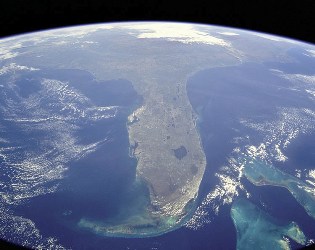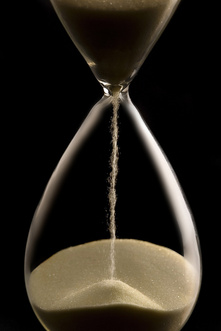 With the recent spate of natural disasters–from the Haiti earthquake to the Iceland volcano, everyone seems to be asking, “What’s the deal?”
With the recent spate of natural disasters–from the Haiti earthquake to the Iceland volcano, everyone seems to be asking, “What’s the deal?”
Answers range from “Nothing” to “The end is nigh” to “2012” to the ever-ominous “earth changes.” Last weekend at Omega’s NYC conference, Elizabeth Lesser, best-selling author of Broken Open and Omega Institute co-founder, addressed this in a talk about renewal, growth, and change. She shared comforting research–she actually called geologists!–in a sane, comforting spiritual context. In honor of Earth Day, we share her words expanded from that talk into a beautiful essay, below, originally published on Oprah.com. –V.R.
Are things spinning out of control? Well, yes and no…
by Elizabeth Lesser from Oprah.com, 2010 Harpo Productions, Inc. All Rights Reserved.
A couple of nights ago a strong wind blew through the mountainous region where I live. We’re used to a lot of weather here–snowstorms that close the schools, rains that wash out roads, and winds that topple trees. A few times each year we lose electrical power, sometimes for merely hours, but other times for several life-altering days. And it’s not just the lights and appliances that go down; it’s also the television and internet cable. And since our water is drawn from our own well by an electric pump, the water (and toilets) go too.
It’s amazing what we 21st century Americans take for granted. When the power sputters to a halt, so does life as we know it.
On this most recent stormy night my husband and I were driving home from the movies. We were only a few feet from turning down the driveway when a huge pine tree was uprooted by the wind. It fell right into and knocked over a utility pole–a pole that also held a transformer (you don’t know what that is? Neither did I until it exploded in front of our car, burst into flames, and lit the woods on fire.) Basically, a transformer is a device that takes in electricity at a higher voltage, lets it run through lots of coils wound around an iron core, and then transforms it into a voltage we can use in our homes.
Are you still with me? I promise this science lesson is leading somewhere.
Next time you’re out and about–in the city or the country–look up at the wires and follow them until you get to a pole with a square-shaped object. That’s the transformer. That innocent-looking metal box you pass by every day is a bomb waiting to explode. Forget about the Christmas underpants bomber–there are potential terrorists suspended on poles all around us. I am not sharing this information to frighten you, but merely to illustrate a point I would like to make: Our everyday humdrum life is wildly unstable, almost improbable, and therefore a miracle. Just the fact that most of us make it from birth to old age without being snuffed out prematurely is incredible. I sometimes imagine myself as a very old lady, lying on my deathbed, astonished that I made it there alive!
Life’s instability has seemed particularly cruel this year. The January earthquake in Haiti is estimated to have killed as many as 250,000 people, injured 300,000 more, and left more than 1,000,000 homeless. The magnitude-8.8 earthquake that rocked Chile in February was violent enough to move the entire city of Concepcion at least 10 feet to the west. Smaller rumblings of the Earth’s crust have occurred in Indonesia, Mexico, Turkey, Taiwan, China, and even Chicago in the past few months. Add to that terrorist acts, wars, genocide, nuclear proliferation, rising temperatures, melting icecaps…. Does it seem that things are becoming less and less stable here on Planet Earth?
I think the answer to that question is both no and yes. Let’s start with the “no” part of the answer: No, I don’t think things are less stable here on Planet Earth. According to the US Geological Survey, the earth usually has one magnitude-8 or higher earthquake per year, some 17 quakes between 7 and 7.9, and roughly 132 earthquakes a year with a magnitude of between 6 and 6.9. Thus, the recent earthquakes are not abnormal in frequency, scientists say, but have received more attention because of the loss of human life and the almost constant flow of news around the world.
And what about terrorism, war, and global hostilities in general? Dr. Steven Pinker, who is a professor in the Department of Psychology at Harvard, writes, “We are probably living in the most peaceful moment of our species’ time on earth.” Sound improbable? Pinker gives examples of much more brutal periods of history, including sixteenth-century Paris, when a popular form of entertainment was cat-burning, whereby a cat would be lowered by a sling into a fire. The spectators, including kings and queens, would shriek with laughter as the animals howled with pain and burned to death. “Today, says Pinker, “such sadism would be unthinkable in most of the world. This change in sensibilities is just one example of perhaps the most important and most underappreciated trend in the human saga: Violence has been in decline over long stretches of history. In the decade of Darfur and Iraq, and shortly after the century of Stalin, Hitler, and Mao, the claim that violence has been diminishing may seem somewhere between hallucinatory and obscene. Yet recent studies…point to exactly that conclusion.”
Now, how about environmental instability? That has to be getting worse, right? There’s overwhelming evidence that global warming brought on by too many human beings burning too much fossil fuel and taking up too much room on our crowded planet, is changing the nature of life on Earth. But before we get into that, may I just remind you that massive changes to the Earth’s climate and terrain and species have occurred throughout the planet’s history: ice ages, volcanic eruptions, species loss, continental drift, and even collisions with asteroids, one of which may have wiped out the dinosaurs. So, that’s the “no” part of my answer to the question, “Is life becoming less and less stable?” Now for the “yes” part: Yes, I do think that we humans have added a new and significant layer of instability to the already basic tenuousness of life. There are now billions of us, living closer together, creating ever-more deadly toxins and weapons, and using up the planet’s precious resources. So an earthquake, or a drought, or a war can affect many more people. We have altered the Earth’s ecosystems so radically that life is no longer possible for many species of animals, insects, and plants. If we keep gobbling up habitats, stripping the forests, thinning the atmosphere, and polluting the water, life for humans may go the way of the dinosaurs. Former president of the Czech Republic, Vaclav Havel, sees our times as a test: “Either we will achieve an awareness of our place in the living and life-giving organism of our planet,” Havel says, “or we will face the threat that our evolutionary journey may be set back thousands or even millions of years. That is why we must see this issue as a challenge to behave responsibly and not as a harbinger of the end of the world.” That’s a test I pray we pass.
There’s another reason why life may feel a tad more out of control these days: Unlike our ancestors, we seem to think things should be controllable. We’ve become accustomed to being warm in the winter and cool in the summer; if we get sick, we expect to get better; we eat three easy meals a day, and rely on quick transportation and instant communication. But these are all relatively new developments in the march of human history. A couple of centuries ago there were no such things as central heat, AC, antibiotics, supermarkets, automobiles, or computers. In 1903–a little more than a hundred years ago–the United States bureau of statistics listed these facts about life in America: eight percent of homes had a telephone. There were 8,000 cars in the US and 144 miles of paved roads. 14 percent of homes had a bathtub, and most American women washed their hair once a month and used borax or egg yolks for shampoo. Ninety percent of all U.S. physicians had no college education. Instead, they attended medical schools, many of which were condemned by the government as “substandard.” The average life expectancy in the United States was 47.
While it’s much more pleasant to live with the conveniences we have become accustomed to, you have to admit they can create a false sense of security. We’re horrified when “acts of God” occur–earthquakes, floods, disease, death. We take these things personally; we want to blame someone for not protecting us even when there’s no one to blame but the nature of life
itself. No matter how many advances humanity makes, no matter how much money or power an individual has, we will always be fragile creatures, living on a tiny planet, supported by a sun that will burn itself out, in an infinite, mysterious universe. Nothing stable about any of that!
Is there a way to live with the knowledge of our basic instability without turning into an anxiety-ridden fraidy cat? I think so. For me, staying awake to the fragility of life makes me appreciate it more on the one hand, and leads me to explore the reality of an eternal soul on the other hand. That’s why I have spent my life studying the texts of many faiths, and doing a variety of spiritual practice: meditation, and prayer, and contemplation. As Einstein said, “I want to know the thoughts of God; the rest are just details.”
Back to the power outage in my hometown. I’m on day three of the neighborhood blackout: I am writing this in front of my fireplace, in the early spring evening, by the light of my computer. The little blinking icon at the top of my screen indicates that I have 16% of my battery power left. I better wrap this article up. It’s only 9 p.m., but we’ve gotten into bed early the past two nights and read by the light of a candle. Not only because it’s sort of romantic, but also because there’s nothing else to do! No email, no television, no radio. And early to bed means more hours of sleep–something we need. Without the symphony of electrical appliances, the furnace, and the white noise machine we use to drown out the other sounds, the house is quieter; the whole world seems more still.
Last night before heading to bed, I slipped outside to pee under the stars. Squatting on the wet ground, gazing up at the star-studded sky, a strange feeling came over me. Something switched in my consciousness–the way it sometimes does when I meditate or pray. Instead of feeling small and scared, I felt free. I let my soul drift peacefully in the vast universe, my sails filled with the breeze of eternity. It was if I was looking down on our precious earth. Once again, I realized that our sun is a mass of combustible gasses; that our planet is a temporary miracle held together by gravity and grace; and that while we are not promised physical security we can still perceive the eternity of the soul and relax into its mystery. I felt at peace with the way things are, and at the same time, I wanted to do what I could to protect this beautiful earth and its miraculous creatures.
I sort of hope the power stays out for a few more days.
Like what you see? Click here to subscribe and get Fresh Living in your in-box every day

